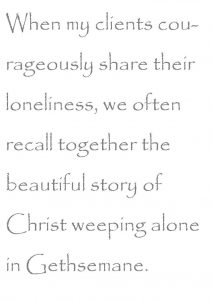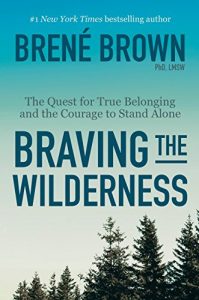On Loneliness
Kim DeCelle, Contributer
Writing that is transforming takes us into the darkest spaces of our conscious. It beckons us to own and celebrate the aspects of our lives that are most personal, and also most universal. As a thinker, scholar, and writer, it is my mission to use the written word to start a conversation, to make it safe for people to own their brokenness together, and to open a communal space where humanity can be transformed by such conversations.I had one such profound communal experience a few weeks ago. I attended a lecture by social worker, author, and scholar, Brené Brown, on her new book, Braving the Wilderness.

For those who don’t know me, I am a long-time psychotherapist and social worker by trade, and have recently re-entered the scholarly world as a doctoral student. One thing I have come to know is that many, many researchers and research projects come and go. Academic researchers, striving for originality, are good at finding that obscure niche that 10 people know about. And much research is quickly forgotten once it reaches coveted publication status.
But Brené’s work is different. Brené is a grounded theorist. By that I mean that she conducts qualitative research, which seeks to understand big themes and concepts by conducting many interviews. Grounded theory is a profound tool that gets at the heart of why people think, feel, act and believe what they do. Grounded theory penetrates the heart of human consciousness and experience.
Brené first became a household name several years back when she did a Ted Talk on her grounded theory research on shame and vulnerability. The talk went viral, and is one of the top 5 viewed lectures of all time. This early work has since ignited a national conversation on these topics. Brené is a master at opening up our dark spaces and starting conversations that bring people together. As a master teacher and scholar, Brené speaks to the scholarly community. More significantly, she connects with the ordinary people. As a psychotherapist, my homeless clients used to read Brene’s work, and then would share with me that it gave them hope. Brené ’s unflinching honesty continues to give me hope that thoughtful scholarly research really can change and define the public consciousness.
Loneliness–the Constant Companion
Brené writes so much of substance. But it is her work on loneliness that has been on my mind of late. Brené confides that loneliness has dominated 3 decades of her life. Loneliness was her constant companion as she battled addictions. She found, as a young researcher, her ideas were routinely discounted. Even as her Ted Talk went viral and reached millions of views, she battled a sense of not belonging. Ironically, she shares this truth about her deep loneliness to a packed audience of 2,500 people.

That night, last September, as I heard Brené talk, I felt this profound sense of own our collective truth about loneliness, which could somehow transform that suffering. Brené ’s confession allowed me to own the loneliness that has also been a part of my own passage. I’m thinking of experiences of loneliness being bullied in middle and high school, and the budding nonconformity that has tracked through every part of my adult life. My decision not to change my last name when I was married, to be childless, to become a vegetarian, to embrace radical politics, to be in a religious no-man’s-land, finding profound love for both Buddhism and Christian faith.
Brené ’s words are profound because they tap the essence of human experience. I spent a decade in the field talking to thousands of people about their deep and profound “yuckiness.” Doing therapy is much like peeling away the layers of an onion, providing people with the safe space to be vulnerable. I can tell you that for many people, loneliness is the deepest, most vulnerable, final layer of that onion. People will often tell you about loneliness right before they talk about questions of faith and ultimately meaning. The therapy hour is much like a confessional. People will admit they committed crimes, told profound lies, cheated, and stole before they will share with you that they are lonely.
True Belonging
Loneliness is fundamentally about this big concept of belonging. Brené confronts the lie of looking for true belonging outside ourselves. She writes:Don’t walk through the world looking for evidence that you don’t belong, because you will always find it. Don’t walk through the world looking for evidence that you are not enough, because you will always find it.
Our culture has a way of fueling loneliness, bringing more pain and suffering.
Brené says,
…In all the research I have done, one thing I know for certain without a doubt: “In the absence of love and belonging, there is always suffering.
Yet, loneliness is not just a psycho-social construct. Brené finds that questions are belonging are also profoundly spiritual.
True belonging is a spiritual practice, the ability to find sacredness in being a part of something, but also the courage to stand alone.
Loneliness on the Christian Path
Brene’s data led her to a place where true belonging is not about feeling good and fitting in. True belonging is about belonging to ourselves, and perhaps, belonging to one who intimately knew loneliness. When my clients courageously share their loneliness, we often recall together the beautiful story of Christ weeping alone in Gesthemene. We read about a Christ who was itinerant, who was alone in every sense of the word, and yet at home among the broken and weary masses, among the tax collectors, prostitutes, the mentally ill, and of those ill repute.
Embracing Christian faith means that loneliness will be a profound part of our passage through this life. As a Christ follower, if we take that title seriously, we will stand alone, but if we are courageous, we will carve out a space for others to dwell beside us in our loneliness. We will join with Christ, weeping in Gesthemene, and in so doing, we will pave a path for others who also journey alone. We cannot speak truth to power while striving to fit in with the fancy people with fancy cars. We cannot overturn the tables of the money changers and if we cannot own that place of deep belonging and conviction within ourselves, of knowing who we are and whose we are, of being clear and grounded in our convictions.
The Spirituality of Loneliness and Belonging
Paradoxically, we are at home, we find belonging, when we find ourselves–that vulnerable, broken, yet redeemed self who dwells alone at the foot of the cross. Maya Angelou writes:
You are only free when you realize you belong no place-you belong every place-no place at all. The price is high, the reward is great.
What I seek to do through this article, is to continue what I feel that Brené started that night, to bring to others her ideas to the public square, and also appropriate her ideas within a Christian lens, a perspective she also shares and readily speaks of in her talks. Brené lightheartedly shared with us that part of being true to her own identity is rejecting speaking engagements that don’t allow her to talk about “cussing and praying.” Why does she do this? She has found these activities to be a fundamental part of the human experience of confronting pain.
So let this be a space where we can cuss and pray together, about loneliness, about the state of our world and how these ideas challenge us to be more connected, more alive, more vulnerable, and therefore, more human together.
